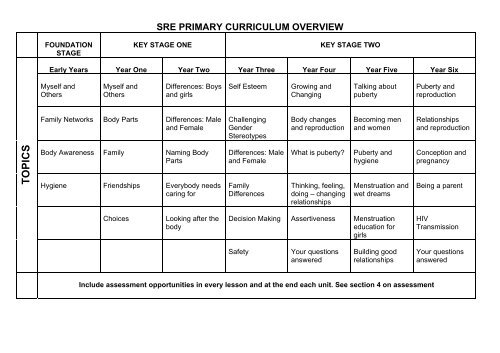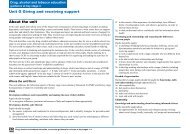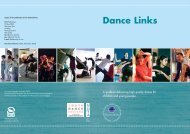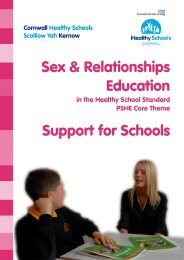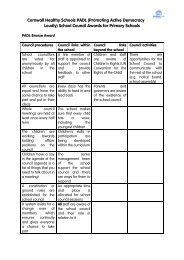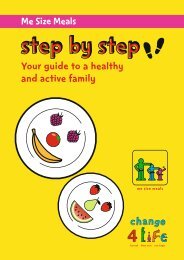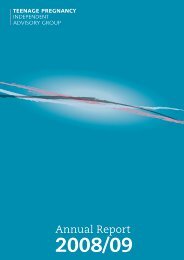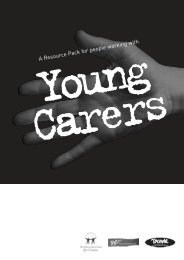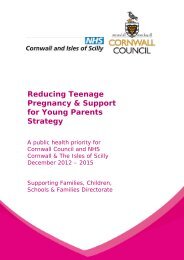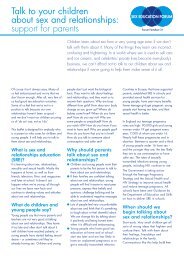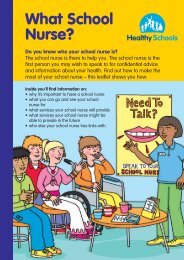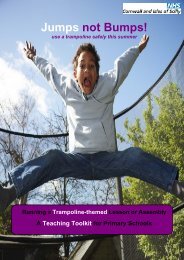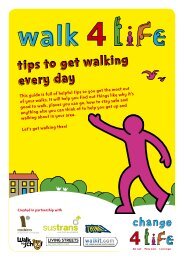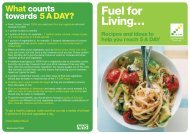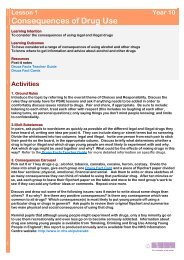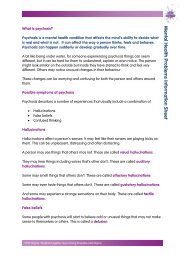(SRE) Primary Scheme of Work - Healthy Schools London
(SRE) Primary Scheme of Work - Healthy Schools London
(SRE) Primary Scheme of Work - Healthy Schools London
Create successful ePaper yourself
Turn your PDF publications into a flip-book with our unique Google optimized e-Paper software.
<strong>SRE</strong> PRIMARY CURRICULUM OVERVIEW<br />
FOUNDATION<br />
STAGE<br />
KEY STAGE ONE<br />
KEY STAGE TWO<br />
Early Years Year One Year Two Year Three Year Four Year Five Year Six<br />
Myself and<br />
Others<br />
Myself and<br />
Others<br />
Differences: Boys<br />
and girls<br />
Self Esteem<br />
Growing and<br />
Changing<br />
Talking about<br />
puberty<br />
Puberty and<br />
reproduction<br />
Family Networks Body Parts Differences: Male<br />
and Female<br />
Challenging<br />
Gender<br />
Stereotypes<br />
Body changes<br />
and reproduction<br />
Becoming men<br />
and women<br />
Relationships<br />
and reproduction<br />
TOPICS<br />
Body Awareness Family Naming Body<br />
Parts<br />
Hygiene Friendships Everybody needs<br />
caring for<br />
Differences: Male<br />
and Female<br />
Family<br />
Differences<br />
What is puberty?<br />
Thinking, feeling,<br />
doing – changing<br />
relationships<br />
Puberty and<br />
hygiene<br />
Menstruation and<br />
wet dreams<br />
Conception and<br />
pregnancy<br />
Being a parent<br />
Choices<br />
Looking after the<br />
body<br />
Decision Making Assertiveness Menstruation<br />
education for<br />
girls<br />
HIV<br />
Transmission<br />
Safety<br />
Your questions<br />
answered<br />
Building good<br />
relationships<br />
Your questions<br />
answered<br />
Include assessment opportunities in every lesson and at the end each unit. See section 4 on assessment
Foundation Stage<br />
Learning Intentions and Outcomes Early Years Foundation Stage Links Suggested Resources<br />
Foundation Stage<br />
Unit One:<br />
Myself and Others<br />
Learning Intention:<br />
To recognise some feelings.<br />
To recognise that their behaviour affects other<br />
people, especially when angry.<br />
Learning Outcomes:<br />
To begin to have identified some <strong>of</strong> their feelings<br />
and recognised some <strong>of</strong> the ways they express<br />
them.<br />
To recognise how our feelings can influence our<br />
friendships.<br />
To realise that their behaviour (words and actions)<br />
can affect other people.<br />
PSE<br />
Self confidence and self esteem<br />
Making Relationships<br />
Behaviour and Self Control<br />
Sense <strong>of</strong> Community<br />
Early Years Foundations Stage, Sex and<br />
Relationship Education <strong>Scheme</strong> <strong>of</strong> <strong>Work</strong> for<br />
Foundation Stage, Key Stage 1 and Key<br />
Stage 2, Croydon <strong>Healthy</strong> <strong>Schools</strong><br />
The whole Foundation Stage Unit is taken<br />
with kind permission from the Croydon<br />
<strong>Scheme</strong> <strong>of</strong> <strong>Work</strong>.<br />
Foundation Stage<br />
Unit Two<br />
Family Networks<br />
Learning Intention:<br />
That family and friends care for each other.<br />
Learning Outcomes:<br />
To have identified family members and friends and<br />
the roles that they play.<br />
To know who they can talk to at home and at<br />
school<br />
PSE<br />
Making Relationships<br />
Self Care<br />
Sense <strong>of</strong> Community
Foundation Stage<br />
Foundation Stage<br />
Unit Three<br />
Body Awareness<br />
Learning Intention:<br />
To appreciate and value their body, its capabilities<br />
and<br />
uniqueness.<br />
Learning Outcomes:<br />
To know that humans produce babies that grow<br />
into children and then into adults.<br />
To consider the ways they have changed<br />
physically since they were born.<br />
To begin to recognise the proper names for the<br />
external parts <strong>of</strong> the body.<br />
To be able to describe some <strong>of</strong> the functions <strong>of</strong><br />
some <strong>of</strong> the parts <strong>of</strong> the body.<br />
Unit Four<br />
Hygiene<br />
Learning Intention:<br />
To understand why hygiene is important.<br />
Learning Outcomes:<br />
Explain why it is important to keep clean.<br />
Understand some basic hygiene routines.<br />
Understand some areas in which they<br />
can look after themselves e.g. dressing and<br />
undressing<br />
PD<br />
<strong>Healthy</strong> and Bodily Awareness<br />
PSE<br />
Self Care<br />
PD<br />
<strong>Healthy</strong> and Bodily Awareness
Key Stage 1: Year 1<br />
Learning Intentions and Outcomes End <strong>of</strong> Key Stage Statements Suggested Resources<br />
Year 1<br />
Lesson One:<br />
Myself and others<br />
Learning Intention<br />
To know the importance <strong>of</strong> valuing oneself<br />
To recognise that everyone is different<br />
Learning Outcomes<br />
To describe and begin to value individuality and to<br />
recognise and celebrate their emotions, gifts and<br />
talents.<br />
To know and value the different groups to which<br />
they belong.<br />
To recognise similarities and differences between<br />
themselves and their peers<br />
PSHE & Citizenship Framework<br />
1d, to think about themselves, learn form<br />
their experiences and recognise what<br />
they are good at<br />
2f, that they belong to various groups<br />
and communities, such as family and<br />
school<br />
4c, to identify and respect the differences<br />
and similarities between people<br />
Year 1, Sex and Relationship Education, Croydon<br />
<strong>Healthy</strong> <strong>Schools</strong><br />
The whole Year 1 Unit is taken with kind<br />
permission from the Croydon <strong>Scheme</strong> <strong>of</strong> <strong>Work</strong>.<br />
Year 1<br />
Lesson Two<br />
Body Parts<br />
Learning Intention<br />
To recognise their bodies’ capabilities and<br />
uniqueness.<br />
Learning Outcomes<br />
To identify similarities and differences between<br />
themselves and the opposite gender.<br />
• To recognise and name, using the proper<br />
terminology,<br />
parts <strong>of</strong> the body and what those parts do.<br />
PSHE & Citizenship Framework<br />
3e, the names <strong>of</strong> the main parts <strong>of</strong> the<br />
body<br />
4c
Year 1<br />
Year 1<br />
Lesson Three<br />
Family<br />
Learning Intention<br />
To know that there are different types <strong>of</strong> family and<br />
all families have special roles in children’s lives.<br />
Learning Outcomes<br />
To be able to describe their family.<br />
To understand why their families are special.<br />
To identify different ways that families and<br />
individual<br />
members care for each other.<br />
To have identified their special people and be able<br />
to describe what makes them special<br />
Lesson Four<br />
Friendships<br />
Learning Intention<br />
To understand what friendship is<br />
Learning Outcomes<br />
To describe who a friend is and what a friend does.<br />
To demonstrate some skills needed to make and<br />
maintain friendships<br />
PSHE & Citizenship Framework<br />
1b, to share their opinions on things that<br />
matter to them and explain their views<br />
2a, to take part in discussions with one<br />
other person and the whole class<br />
4c, to recognise how their behaviour<br />
affects other people<br />
4d that family and friends should care for<br />
each other<br />
PSHE & Citizenship Framework<br />
1c, to recognise, name and deal with their<br />
feelings in a positive way<br />
2e, to realise that people and other living<br />
things have needs and that they have<br />
responsibilities to meet them<br />
4b, to listen to people and play and work<br />
cooperatively<br />
4d,
Year 1<br />
Lesson Five<br />
Choices<br />
Learning Intention<br />
To recognise most children can make choices.<br />
Learning Outcomes<br />
To understand that they have choices.<br />
To recognise that choices and responses will be<br />
affected by different factors.<br />
To recognise that some choices will be wrong and<br />
other<br />
choices will be right.<br />
To identify a simple way for decision making<br />
Additional recommended resources<br />
PSHE & Citizenship Framework<br />
1a, to recognise what they like and<br />
dislike, what is fair and unfair and what is<br />
right and wrong<br />
1b,<br />
2c, to recognise choices they can make<br />
and recognise the difference between<br />
right and wrong<br />
3a to make simple choice that improve<br />
their health and well-being<br />
Key Stage 1 Lesson plans, p 47-73, Laying the Foundations: Sex and Relationships Education in <strong>Primary</strong> <strong>Schools</strong>, Anna Martinez & Vanessa Cooper, NCB,<br />
2006<br />
Let’s Grow with Nisha and Joe, www.fpa.org.uk<br />
Cambridge PSHE Service, Key Stage 1 Year Group 1, Unit 1 How My Body <strong>Work</strong>s and Changes<br />
KS1 Sec 3 lesson 18, I am I Know I Can, Tacade<br />
The Truth About Babies, Andrea Shavick<br />
You’ll Soon Grow Into Them TItch, Pat Hutchins<br />
Living and Growing, Unit 1, Programme 1, http://www.channel4learning.com/
Key Stage 1: Year 2<br />
Year 2<br />
Year 2<br />
Year 2<br />
Learning Intentions and Outcomes End <strong>of</strong> Key Stage Statements Suggested Resources<br />
Lesson One:<br />
Differences: Boys & Girls<br />
Learning Intention<br />
To understand and respect differences and similarities<br />
between boys and girls<br />
Learning Outcomes<br />
Describe the ways boys and girls can be the same and<br />
different<br />
Understand that some people have fixed ideas about what<br />
boys and girls can do<br />
Describe the difference between male and female babies<br />
Lesson 2<br />
Difference Male and Female<br />
Learning Intention<br />
To explore some <strong>of</strong> the differences between males and<br />
females and to understand how this is part <strong>of</strong> the life cycle<br />
Learning Outcomes<br />
Describe some differences between male and female<br />
animals<br />
Describe some differences between boys and girls<br />
Understand that making a new life needs a male and a<br />
female<br />
Lesson Three<br />
Naming body parts<br />
Learning Intention<br />
To focus on sexual difference and to name body parts<br />
Learning Outcomes<br />
Describe the differences between males and females<br />
Name the male and female body parts<br />
PSHE & Citizenship Framework<br />
1b share their opinions on things that matter<br />
to them and explain their views<br />
4c, to identify and respect the differences and<br />
similarities between people<br />
PSHE & Citizenship Framework<br />
3e, the names <strong>of</strong> the main parts <strong>of</strong> the body<br />
4c,<br />
National Curriculum Science<br />
Sc2/1b, that animals including humans move,<br />
feed, grow, use their senses, and reproduce<br />
PSHE & Citizenship Framework<br />
3e,<br />
National Curriculum Science<br />
Sc2/1b<br />
2a, to recognise and compare the main<br />
external parts <strong>of</strong> the bodies <strong>of</strong> humans and <strong>of</strong><br />
other animals<br />
Year 2 Lesson 1, Teaching <strong>SRE</strong> with<br />
Confidence, The Christopher Winter<br />
Project, www.tcwp.co.uk<br />
Year 2 Lesson 2, Teaching <strong>SRE</strong> with<br />
Confidence, The Christopher Winter<br />
Project<br />
DVD: Living & Growing, Unit 1,<br />
Programme 1, Differences<br />
Let’s Grow with Nisha and Joe,<br />
www.fpa.org.uk<br />
Year 2 Lesson 3, Teaching <strong>SRE</strong> with<br />
Confidence, The Christopher Winter<br />
Project<br />
Let’s Grow with Nisha and Joe,<br />
www.fpa.org.uk
Year 2<br />
Learning Intentions and Outcomes End <strong>of</strong> Key Stage Statements Suggested Resources<br />
Lesson Four<br />
Everybody Needs Caring For<br />
Learning Intention<br />
To appreciate that everyone needs to be cared for<br />
Learning Outcomes<br />
Identify ways to show care towards each other<br />
Understand that we all have different needs and need<br />
different types <strong>of</strong> care<br />
PSHE & Citizenship Framework<br />
2e, to realise that people and other living<br />
things have needs, and that they have<br />
responsibilities to meet them<br />
3d, about the process <strong>of</strong> growing from young<br />
to old and how people’s needs change<br />
4d that families and friends should care for<br />
each other<br />
Year 2 Lesson 5, Supporting Sex and<br />
Relationship Education in the <strong>Primary</strong><br />
School, Islington <strong>Healthy</strong> <strong>Schools</strong><br />
Additional Resources<br />
The World Is Full <strong>of</strong> Babies, Mick<br />
Manning & Brita Granstrom<br />
Let’s Grow with Nisha and Joe,<br />
www.fpa.org.uk<br />
2008<br />
Year 2<br />
Lesson Five<br />
Looking after the body<br />
Learning Intention<br />
To learn why it is important to keep clean.<br />
Learning Outcomes<br />
Describe how to look after particular parts <strong>of</strong> the body<br />
Explain why it is important to keep clean<br />
Describe and carry out basic hygiene<br />
Know what to take responsibility for and when to ask for<br />
help<br />
PSHE & Citizenship Framework<br />
1d, to think about themselves, learn from their<br />
experiences and recognise what they are<br />
good at<br />
3a, how to make simple choices that improve<br />
their health and well-being<br />
3b, to maintain personal hygiene<br />
3e<br />
Year 2 Topic 2, Sex and Relationship<br />
Education, Croydon <strong>Healthy</strong> <strong>Schools</strong><br />
Additional Resources<br />
KS1 Sec 3 lesson 16, Keeping Clean. I<br />
am, I Know, I Can, Tacade<br />
Additional recommended resources<br />
Key Stage 1 Lesson plans, p 47-73, Laying the Foundations: Sex and Relationships Education in <strong>Primary</strong> <strong>Schools</strong>, Anna Martinez & Vanessa Cooper, NCB,<br />
2006
Key Stage 2: Year 3<br />
Year 3<br />
Year 3<br />
Year 3<br />
Learning Intentions and Outcomes End <strong>of</strong> Key Stage Statements Suggested Resources<br />
Lesson One:<br />
Self Esteem<br />
PSHE & Citizenship Framework<br />
Learning Intention<br />
To recognise their worth as individuals by identifying 1b, to recognise their worth as individuals by<br />
positive things about themselves and their achievements, identifying positive things about themselves<br />
and by beginning to identify an area that needs to be and their achievements, seeing their<br />
strengthened.<br />
mistakes, making amends and setting<br />
Learning Outcomes<br />
personal goals<br />
To see oneself as special, to recognise strengths, abilities<br />
and personal characteristics.<br />
To have begun to build self esteem and confidence by<br />
looking at their skills and achievements<br />
To begin to identify personal areas that need improvement<br />
Lesson Two:<br />
Challenging Gender Stereotypes<br />
Learning Intention<br />
To recognise and challenge gender stereotypes<br />
Learning Outcomes<br />
Understand that males and females can do the same<br />
tasks and enjoy the same things<br />
Understand that there are different stereotypes (fixed<br />
ideas) about what males and females can do.<br />
Lesson Three:<br />
Differences: Males and Females<br />
Learning Intention<br />
To recognise the difference between males and females<br />
including body parts<br />
Learning Outcomes<br />
Identify the differences between males and females<br />
Name male and female body parts using agreed words<br />
PSHE & Citizenship Framework<br />
1b,<br />
4e to recognise and challenge<br />
stereotypes,<br />
PSHE & Citizenship Framework<br />
3c, about how the body changes as they<br />
approach puberty<br />
National Curriculum Science<br />
2a, to recognise and compare the main<br />
external parts <strong>of</strong> the bodies <strong>of</strong> humans<br />
and <strong>of</strong> other animals<br />
Year 3 Topic 1, Sex and<br />
Relationship Education <strong>Scheme</strong><br />
<strong>of</strong> <strong>Work</strong>, Croydon <strong>Healthy</strong><br />
<strong>Schools</strong><br />
Year 3 Lesson 1 Teaching <strong>SRE</strong><br />
with Confidence, The<br />
Christopher Winter Project<br />
Amazing Grace, Mary H<strong>of</strong>fman<br />
and Caroline Binch<br />
Happy Families, Allan Ahlberg<br />
Princess Smartypants, Babette<br />
Cole<br />
William’s Doll, Charlotte<br />
Zolotow<br />
Year 3 Lesson 2, Teaching <strong>SRE</strong><br />
with Confidence, The<br />
Christopher Winter Project<br />
Channel 4 Living and Growing<br />
Unit 1, Programme 1,<br />
Differences
Year 3<br />
Lesson Four:<br />
Family differences<br />
Learning Intention<br />
To recognise that families are different and to challenge<br />
stereotypes about families<br />
Learning Outcomes<br />
To know that all families are different and have different<br />
family members<br />
Understand that people sometimes have stereotypes<br />
(fixed ideas) about families<br />
PSHE & Citizenship Framework<br />
4c to be aware <strong>of</strong> different types <strong>of</strong><br />
relationship, including marriage and those<br />
between friends and families<br />
4e to recognise and challenge<br />
stereotypes,<br />
Year 3 Lesson 3, Teaching <strong>SRE</strong><br />
with Confidence, The<br />
Christopher Winter Project<br />
The Family Book, Todd Parr<br />
Who’s in a Family? Robert<br />
Skutch<br />
Nutmeg Gets a Little Sister,<br />
Judith Foxon<br />
Happy Families, Allan Ahlberg<br />
Spark Learns to Fly, Judith<br />
Foxon<br />
Year 3<br />
Year 3<br />
Lesson Five:<br />
Decision Making<br />
Learning Intention<br />
To be able to demonstrate simple decision making<br />
strategies<br />
Learning Outcomes<br />
To recognise that choices require decisions.<br />
To be able to consider different possibilities.<br />
To demonstrate effective decision making skills.<br />
Lesson Six:<br />
Safety<br />
Learning Intention<br />
To be able to use basic techniques to resist pressure.<br />
Learning Outcomes<br />
To be able to identify potential dangers in different<br />
environments<br />
To recognise that pressure to behave in an acceptable or<br />
risky way can come from a variety <strong>of</strong> sources, including<br />
media and people they know<br />
To demonstrate basic techniques to resist pressure<br />
To know who they can go to for support and help<br />
PSHE & Citizenship Framework<br />
1c, to face new challenges positively by<br />
collecting information, looking for help,<br />
making responsible choices and taking action<br />
2f, to look after their money and realise that<br />
future wants and needs may be met through<br />
saving<br />
4a that their actions affect themselves and<br />
others, to care about other people’s feelings<br />
and to try to see things from their points <strong>of</strong><br />
view<br />
PSHE & Citizenship Framework<br />
2k, to explore how the media present<br />
information<br />
3e, to recognise the different risks in different<br />
situations and then decide how to behave<br />
responsibly, including sensible road use, and<br />
judging what kind <strong>of</strong> physical contact is<br />
acceptable or unacceptable<br />
Year 3 Topic 3, Sex and<br />
Relationship Education <strong>Scheme</strong><br />
<strong>of</strong> <strong>Work</strong>, Croydon <strong>Healthy</strong><br />
<strong>Schools</strong><br />
Year 3 Topic 4, Sex and<br />
Relationship Education <strong>Scheme</strong><br />
<strong>of</strong> <strong>Work</strong>, Croydon <strong>Healthy</strong><br />
<strong>Schools</strong>
Additional recommended resources<br />
Key Stage 2, Lesson plans, p 74-109, Laying the Foundations: Sex and Relationships Education in <strong>Primary</strong> <strong>Schools</strong>, Anna Martinez & Vanessa<br />
Cooper, NCB, 2006<br />
Addressing Lesbian, Gay, Bisexual And Transgender Equality In <strong>Primary</strong> <strong>Schools</strong>: Books For Use In <strong>Primary</strong> And Early Years Settings,<br />
http://www.nooutsiders.sunderland.ac.uk
Key Stage 2: Year 4<br />
Year 4<br />
Year 4<br />
Learning Intentions and Outcomes End <strong>of</strong> Key Stage Statements Suggested Resources<br />
Lesson One:<br />
Growing and Changing<br />
Learning Intention<br />
To understand the human life cycle and how the body<br />
changes<br />
Learning Outcomes<br />
Describe the main stages <strong>of</strong> the human life cycle<br />
Describe the body changes that happen when a child<br />
grows up<br />
Lesson Two:<br />
Body Changes and Reproduction<br />
Learning Intention<br />
To identify some basic facts about puberty, reproduction<br />
and pregnancy<br />
Learning Outcomes<br />
Know that during puberty the body changes from a child<br />
into a young adult<br />
Understand why the body changes in puberty<br />
Identify some basic facts about pregnancy<br />
PSHE & Citizenship Framework<br />
3c, learn about how the body changes<br />
as children approach puberty<br />
National Curriculum Science<br />
1a, that the life processes common to<br />
humans and other animals include nutrition,<br />
movement, growth and reproduction<br />
2f, about the main stages <strong>of</strong> the human life<br />
cycle<br />
PSHE & Citizenship Framework<br />
3c,<br />
1d, to recognise as they approach<br />
puberty, how people’s emotions<br />
change at that time and how to deal<br />
with their feelings towards themselves,<br />
their families and others in a positive<br />
way<br />
National Curriculum Science<br />
2f,<br />
Year 4 Lesson 1,Teaching <strong>SRE</strong> with<br />
Confidence , The Christopher Winter<br />
Project<br />
Year 4 Lesson 2, Teaching <strong>SRE</strong> with<br />
Confidence, The Christopher Winter<br />
Project<br />
Channel 4 Living and Growing Unit 1,<br />
Programme 2, How did I get here?<br />
Tell Me Again About The Night I Was<br />
Born, Jamie Lee Curtis.<br />
Happy Families, Allan Ahlberg<br />
The Family Book, Todd Parr<br />
Who’s in a Family, Robert Skutch<br />
Year 4<br />
Lesson Three:<br />
What Is Puberty?<br />
Learning Intention<br />
To learn about the physical changes associated with<br />
puberty<br />
Learning Outcomes<br />
Know the physical changes that happen in puberty<br />
Know that each person experiences puberty differently<br />
PSHE & Citizenship Framework<br />
3c,<br />
1d,<br />
National Curriculum Science<br />
2f,<br />
Year 4 Lesson 3, Teaching <strong>SRE</strong> with<br />
Confidence, The Christopher Winter<br />
Project<br />
Hair in Funny Places, Babette Cole
Year 4<br />
Year 4<br />
Lesson Four:<br />
Feeling, Thinking and Doing – Changing relationships<br />
Learning Intention<br />
To learn strategies to deal with feelings in the context <strong>of</strong><br />
relationships<br />
Learning Outcomes<br />
Identify feelings and understand how they affect behaviour<br />
Show awareness that feelings change during puberty and<br />
these changes can affect our relationships<br />
Can practice strategies for managing some feelings<br />
Lesson Five<br />
Assertiveness<br />
Learning Intention<br />
To understand and be able to use assertiveness skills<br />
Learning Outcomes<br />
To have practised being assertive in different situations<br />
PSHE & Citizenship Framework<br />
1d ,<br />
2f, to resolve differences by looking at<br />
alternatives, making decisions and explaining<br />
choices<br />
4a, that their actions affect themselves and<br />
others, to care about other people’s feelings<br />
and to try to see things from their points <strong>of</strong><br />
view<br />
PSHE & Citizenship Framework<br />
2f,<br />
3f, that pressure to behave in an<br />
unacceptable or risky way can come from a<br />
variety <strong>of</strong> sources, including people they<br />
know, and how to ask for help and use basic<br />
techniques for resisting pressure to do wrong<br />
Year 4/5 Lesson 6, Supporting Sex and<br />
Relationship Education in the <strong>Primary</strong><br />
School, Islington <strong>Healthy</strong> <strong>Schools</strong><br />
Year 4 Topic 3, Sex and Relationship<br />
Education <strong>Scheme</strong> <strong>of</strong> <strong>Work</strong>, Croydon<br />
<strong>Healthy</strong> <strong>Schools</strong><br />
Year 4<br />
Lesson Six<br />
Your Questions Answered<br />
Learning Intention<br />
To answer questions with confidence and seek help when<br />
needed<br />
Learning Outcomes<br />
Can answer some questions about puberty and growing<br />
up<br />
Can use appropriate language to discuss puberty<br />
Identify sources <strong>of</strong> information and advice<br />
PSHE & Citizenship Framework<br />
1c, to face new challenges positively by<br />
collecting information, looking for help making<br />
responsible choices, and taking action<br />
3c,<br />
4g, where individuals, families and groups<br />
can get help and support<br />
National Curriculum Science<br />
1a, 2f<br />
Year 4/5 Lesson 7, Supporting Sex and<br />
Relationship Education in the <strong>Primary</strong><br />
School, Islington <strong>Healthy</strong> <strong>Schools</strong><br />
Additional recommended resources<br />
Key Stage 2, Lesson plans, p 74-109, Laying the Foundations: Sex and Relationships Education in <strong>Primary</strong> <strong>Schools</strong>,<br />
Anna Martinez & Vanessa Cooper, NCB, 2006
Key Stage 2: Year 5<br />
Year 5<br />
Learning Intentions and Outcomes End <strong>of</strong> Key Stage Statements Suggested Resources<br />
Lesson One:<br />
Talking About Puberty<br />
Learning Intention<br />
To explore the emotional and physical changes that occur<br />
during puberty<br />
Learning Outcomes<br />
Explain the main physical and emotional changes that<br />
happen during puberty<br />
Ask questions about puberty with confidence<br />
PSHE & Citizenship Framework<br />
1d, to recognise as they approach puberty,<br />
how people’s emotions change at that time<br />
and how to deal with their feelings towards<br />
themselves, their families and others in a<br />
positive way<br />
3c, learn about how the body changes as<br />
children approach puberty<br />
National Curriculum Science<br />
1a, that the life processes common to<br />
humans and other animals include nutrition,<br />
movement, growth and reproduction<br />
2f, about the main stages <strong>of</strong> the human life<br />
cycle<br />
Year 5 Lesson 1, Teaching <strong>SRE</strong> with<br />
Confidence, The Christopher Winter<br />
Project<br />
Living and Growing, Unit 2, Programme<br />
4, Changes DVD<br />
Year 5<br />
Lesson Two:<br />
Becoming Men and Women<br />
Learning Intention<br />
To consider gender stereotyping and sexuality<br />
Learning Outcomes<br />
Understand how our attitudes and values about gender<br />
and sexuality may be affected by factors such as age,<br />
religion and culture<br />
Recognise and challenge gender stereotypes<br />
Understand how media messages affect attitudes, can<br />
cause inequality <strong>of</strong> opportunity and affect behaviour<br />
PSHE & Citizenship Framework<br />
1a, To talk and write about their opinions, and<br />
explain their views on issues that affect<br />
themselves and society<br />
2k, To explore how the media present<br />
information<br />
4e, To recognise and challenge stereotypes<br />
4f, That differences and similarities between<br />
people arise from a number <strong>of</strong> factors,<br />
including cultural, ethnic, racial and religious<br />
diversity gender and disability<br />
Year 5/6 Lesson 2, Supporting Sex and<br />
Relationship Education in the <strong>Primary</strong><br />
School, Islington <strong>Healthy</strong> <strong>Schools</strong><br />
Lets Talk about Sex DVD, Channel 4,<br />
Living and Growing Unit 3, Programme<br />
9
Year 5<br />
Lesson Three:<br />
Puberty and Hygiene<br />
Learning Intention<br />
To explore the impact <strong>of</strong> puberty on the body and the<br />
importance <strong>of</strong> physical hygiene<br />
To explore ways to get support during puberty<br />
Learning Outcomes<br />
Explain how to stay clean during puberty<br />
Describe how emotions change during puberty<br />
Demonstrate how to seek help and support during puberty<br />
PSHE & Citizenship Framework<br />
3c,<br />
National Curriculum Science<br />
2f,<br />
Year 5 Lesson 2, Teaching <strong>SRE</strong> with<br />
Confidence, The Christopher Winter<br />
Project<br />
Year 5<br />
Lesson Four:<br />
Menstruation and wet dreams<br />
Learning Intention<br />
To understand that menstruation and wet dreams are a<br />
normal part <strong>of</strong> growing up<br />
Learning Outcomes<br />
Explain and ask questions about menstruation and wet<br />
dreams<br />
Describe how to manage periods and wet dreams<br />
PSHE & Citizenship Framework<br />
3c,<br />
National Curriculum Science<br />
2f,<br />
Year 5 Lesson 3 Part 1, Teaching <strong>SRE</strong><br />
with Confidence, The Christopher<br />
Winter Project<br />
Year 5<br />
Lesson Five:<br />
Menstruation education for girls<br />
Learning Intention<br />
To explore in menstruation issues in detail with girl only<br />
groups<br />
Learning Outcomes<br />
Understand why girls and women have periods<br />
Know and discuss how to manage periods<br />
PSHE & Citizenship Framework<br />
3c, learn about how the body changes<br />
as children approach puberty<br />
National Curriculum Science<br />
2f, about the main stages <strong>of</strong> the human life<br />
cycle<br />
Year 5 Lesson 3, Additional activities,<br />
Teaching <strong>SRE</strong> with Confidence, The<br />
Christopher Winter Project
Year 5<br />
Lesson Six:<br />
Building Good Relationships<br />
Learning Intention<br />
To appreciate the importance <strong>of</strong> friendship in intimate<br />
relationships<br />
Learning Outcomes<br />
Explain the similarities and differences between<br />
friendships and intimate relationships<br />
Can describe different types <strong>of</strong> intimate relationship<br />
including marriage<br />
PSHE & Citizenship Framework<br />
1a, To talk and write about their opinions, and<br />
explain their views on issues that affect<br />
themselves and society<br />
4a, That their actions affect themselves and<br />
others, to care about other peoples feeling<br />
and to try to see things from their points <strong>of</strong><br />
view<br />
4c To be aware <strong>of</strong> different types <strong>of</strong><br />
relationship, including marriage and those<br />
between friends and families, and to develop<br />
the skills to be effective in relationships<br />
Year 5/6 Lesson 3, Supporting Sex and<br />
Relationship Education in the <strong>Primary</strong><br />
School, Islington <strong>Healthy</strong> <strong>Schools</strong><br />
Additional recommended resources<br />
Key Stage 2, Lesson plans, p 74-109, Laying the Foundations: Sex and Relationships Education in <strong>Primary</strong> <strong>Schools</strong>, Anna Martinez & Vanessa Cooper,<br />
NCB, 2006<br />
Addressing Lesbian, Gay, Bisexual And Transgender Equality In <strong>Primary</strong> <strong>Schools</strong>: Books For Use In <strong>Primary</strong> And Early Years Settings,<br />
http://www.nooutsiders.sunderland.ac.uk<br />
QCA PSHE key stage 2, Sex and relationships education: Unit 5, how the body works and changes in puberty<br />
Girl Talk: All the stuff your sister never told you, Carol Weston pubs Harper Collins<br />
Living and Growing, Unit 3, pages 15, 18, 19, 24, 27, 28, 31; Living and Growing, Unit 3, video programme 7<br />
www.kidshealth.org - animation <strong>of</strong> menstruation<br />
ACTIV <strong>Primary</strong> S<strong>of</strong>tware, Science<br />
Promethean: UK resources, Science<br />
Sex and Relationship Education, Whiteboard Active BBC
Key Stage 2: Year 6<br />
Year 6<br />
Learning Intentions and Outcomes End <strong>of</strong> Key Stage Statements Suggested Resources<br />
Lesson One:<br />
Puberty and Reproduction<br />
Learning Intention<br />
To explore the emotional and physical changes that occur<br />
during puberty<br />
Learning Outcomes<br />
Describe how and why the body changes during puberty in<br />
preparation for reproduction.<br />
Talk about puberty and reproduction with confidence<br />
PSHE & Citizenship Framework<br />
1d, to recognise as they approach puberty,<br />
how people’s emotions change at that time<br />
and how to deal with their feelings towards<br />
themselves, their families and others in a<br />
positive way<br />
3c, learn about how the body changes as<br />
children approach puberty<br />
National Curriculum Science<br />
1a, that the life processes common to<br />
humans and other animals include nutrition,<br />
movement, growth and reproduction<br />
Year 6 Lesson 1, Teaching <strong>SRE</strong> with<br />
Confidence, The Christopher Winter<br />
Project<br />
Living and Growing, Unit 2, Programme<br />
4, Changes DVD<br />
2f, about the main stages <strong>of</strong> the human life<br />
cycle<br />
Year 6<br />
Lesson Two:<br />
Relationships and Reproduction<br />
Learning Intention<br />
To consider reproduction in the context <strong>of</strong> relationships<br />
Learning Outcomes<br />
Explain how babies are made<br />
Discuss different types <strong>of</strong> adult relationships with confidence<br />
PSHE & Citizenship Framework<br />
4c to be aware <strong>of</strong> different types <strong>of</strong><br />
relationships, including marriage and<br />
those between friends and families, and to<br />
develop the skills to be effective in<br />
relationships<br />
National Curriculum Science<br />
1a, 2f,<br />
Year 6 Lesson 2, Teaching <strong>SRE</strong> with<br />
Confidence, The Christopher Winter<br />
Project<br />
DVD - Living and Growing, Unit 2,<br />
Programme 5, ‘How Babies are<br />
Made’.
Year 6<br />
Lesson Three:<br />
Conception and pregnancy<br />
Learning Intention<br />
To explore the process <strong>of</strong> conception and pregnancy<br />
Learning Outcomes<br />
Describe the decisions that have to be made before<br />
having a baby<br />
Know some basic facts about pregnancy and conception<br />
PSHE & Citizenship Framework<br />
2e, That their actions affect themselves and<br />
others, to care about other people’s feelings<br />
and to try to see things from their points <strong>of</strong><br />
view<br />
National Curriculum Science<br />
1a, 2f,<br />
Year 6 Lesson 3, Teaching <strong>SRE</strong> with<br />
Confidence, The Christopher Winter<br />
Project<br />
Year 6<br />
Lesson Four:<br />
Being a Parent<br />
Learning Intention<br />
Learning abut the roles and responsibilities <strong>of</strong> carers and<br />
parents<br />
Learning Outcomes<br />
Identify some <strong>of</strong> the skills and qualities needed to be a<br />
parent and carer<br />
Understand the variety <strong>of</strong> ways in which parents and<br />
carers meet the needs <strong>of</strong> babies and children<br />
Recognise that both men and women can take on these<br />
roles and responsibilities<br />
PSHE & Citizenship Framework<br />
2e,<br />
4a That their actions affect themselves and<br />
others, to care about other people’s feelings<br />
and to try to see things from their points <strong>of</strong><br />
view<br />
National Curriculum Science<br />
2f<br />
Year 5/6 Lesson 6, Supporting Sex and<br />
Relationship Education in the <strong>Primary</strong><br />
School, Islington <strong>Healthy</strong> <strong>Schools</strong><br />
Year 6<br />
Lesson Five:<br />
HIV/AIDS Transmission<br />
Learning Intention<br />
Understand how HIV can be transmitted<br />
Learning Outcomes<br />
Know what is true and false about how someone can<br />
become infected with HIV<br />
PSHE & Citizenship Framework<br />
3b that bacteria and viruses can affect health<br />
and that following simple, safe routines can<br />
reduce their spread<br />
HIV Transmission<br />
Adapted from Teaching and learning<br />
about HIV, Simon Blake & Paula Power,<br />
NCB 2003
Year 6<br />
Lesson Six<br />
Your Questions Answered<br />
Learning Intention<br />
To answer each others questions about sex and<br />
relationships with confidence and find support and advice<br />
Learning Outcomes<br />
Can answer their won questions about sex and<br />
relationships<br />
Can use appropriate language to discuss sex and<br />
relationships with confidence<br />
Can identify sources <strong>of</strong> information, support and advice for<br />
children and young people<br />
PSHE & Citizenship Framework<br />
1c, To face new challenges positively by<br />
collecting information, looking for help,<br />
making responsible choices, and taking<br />
action<br />
4c, To be aware <strong>of</strong> different types <strong>of</strong> relations,<br />
including marriage and those between friends<br />
and families, and to develop the skills to be<br />
effective in relationships<br />
4g Where individuals, families and groups<br />
can get help and support<br />
Year 5/6 Lesson 7, Supporting Sex and<br />
Relationship Education in the <strong>Primary</strong><br />
School, Islington <strong>Healthy</strong> <strong>Schools</strong><br />
Additional recommended resources<br />
Teaching and learning about HIV, p26 -27, Simon Blake & Paula Power, NCB 2003<br />
Two Weeks With The Queen, Morris Gleitzman<br />
Key Stage 2, Lesson plans, p 74-109, Laying the Foundations: Sex and Relationships Education in <strong>Primary</strong> <strong>Schools</strong>, Anna Martinez & Vanessa Cooper,<br />
NCB, 2006<br />
Addressing Lesbian, Gay, Bisexual And Transgender Equality In <strong>Primary</strong> <strong>Schools</strong>: Books For Use In <strong>Primary</strong> And Early Years Settings,<br />
http://www.nooutsiders.sunderland.ac.uk<br />
QCA PSHE key stage 2, Sex and relationships education: Unit 5, how the body works and changes in puberty<br />
Girl Talk: All the stuff your sister never told you, Carol Weston pubs Harper Collins<br />
Living and Growing, Unit 3, pages 15, 18, 19, 24, 27, 28, 31; Living and Growing, Unit 3, video programme 7<br />
www.kidshealth.org - animation <strong>of</strong> menstruation<br />
ACTIV <strong>Primary</strong> S<strong>of</strong>tware, Science<br />
Promethean: UK resources, Science<br />
Sex and Relationship Education, Whiteboard Active BBC


